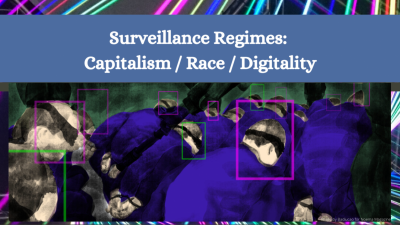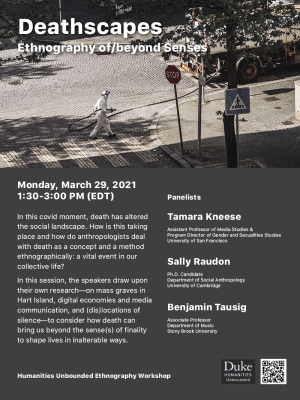Type: Lab
Whiplash: Anthropology in/of Disaster
September 7, 2020
The Ethnography Workshop hosted a conversation with Laurence Ralph (Professor of Anthropology and Director of Center on Transnational Policing, Princeton) and Yarimar Bonilla (Professor of Africana, Puerto Rican & Latino Studies and PhD Program in Anthropology, CUNY Hunter College), two leaders in public/digital/de-colonial/anti-racist anthropology, around the topic of taking anthropology to the streets. We asked how can/must/should ethnography respond to the times. Although the event took place on Labor Day, about sixty people joined the event. The presenters spoke briefly about their work as anthropologists before launching into discussion.
Laurence Ralph, introduced himself as doing an “anthropology of injury.” Injury connects his first book project, Renegade Dreams: Living Through Injury in Gangland Chicago, with his second project with black Chicagoans, tortured in prisons by police officers.
Yarimar Bonilla described herself as an anthropologist of “sovereignty otherwise.” Spanning her dissertation project on the French Caribbean to articles on #Ferguson to her most recent edited volume on Post-Maria Puerto Rico, Aftershocks of Disaster: Puerto Rico Before and After the Storm, non/sovereign places have long been at the center of her research. Across variously paced writings—from tweets to scholarly articles to books—she has engaged multiple publics through specific events and broader historical reflections. Such publics are formed across the bounds of what are conventionally distinguished as academic and non-academic publics. The introductory remarks were followed by an open dialogue with our two speakers.
Syncopated Resonances: Ethnography in/of Fractured Times
October 1, 2020
Ethnography happens through bodily engagement with people and the world. However, the capacious role of body in mediating and medicated ethnography often remains marginal in how ethnography is imagined and pursued. How can we listen and perform ethnography when we can no longer assume continuities of time, space and identities? What does our fractured forms of being and belonging in the current moment teach us about mediated forms of (dis)abilities? How does engagement with the body allow us to imagine ethnography in new ways? How might we lean into the affordances of syncopations—offset time— in a moment already marked by disjuncture?
This two-session event moderated by Yun Emily Wang (Assistant Professor, Ethnomusicology, Duke University) is an experiment in form.
Session One, October 1, Thursday, 9 – 10 am, EST.
Speakers Deborah Kapchan (Professor of Performance Studies, New York University) and Cassandra Hartblay (Assistant Professor of Anthropology, University of Toronto Scarborough) spoke briefly about their experiences of working through the body/bodies, followed by an open dialogue with registered participants.
View Recording of Session One(link opens in a new window/tab)
Session Two, October 5, Monday, 1:30 – 3 pm, EST.
We started the session by streaming the recording of the first session for an hour while sharing our real-time reactions in the chat. An open discussion with the Ethnography Workshop fellows followed, during which we will also field questions and musings. The discussion session will be recorded and shared with the two speakers with possibility (but not responsibility!) of further conversations.
View Recording of Session Two(link opens in a new window/tab)
Surveillance Regimes: Capitalism/Race/Digitality
November 9, 2020
Our speakers for this Ethnography Workshop grapple with the following questions, adding nuance and complexity to current debates about the logics and practices of surveillance capitalism. How do we understand the relationship between cybernetic capitalism and racial capitalism? How are states working with tech firms to maintain racial hierarchies in citizenries and labor markets? How does digital enclosure of Uyghur and Kazakh societies in Northwest China produce a form of original accumulation or capitalist frontier making? How do digital enclosures convert targeted populations into data while at the same time expropriating their labor and produce an underclass of dependent laborers? And how are electronic bracelets, from the US-Mexico border to Europe tracking migrants and creating borders without fences and confinement without walls?
Presentations
Brian Jefferson, "Cybernetic Capitalism, Racial Capitalism"
Cybernetic Capitalism, Racial Capitalism considers surveillance technology from the standpoint of racial capitalist theory. It draws attention to the incentives that states offer tech firms to help maintain racial hierarchy in citizenries and labor markets. Keywords: history of computers, racial capitalism, state theory, urbanization.
Brian Jefferson is Associate Professor of Geography and Geographic Information Science at the University of Illinois Urbana-Champaign. Author of Digitize and Punish: Racial Criminalization in the Digital Age (U Minnesota Press, 2020). My work explores intersections of digital technology, the state, and capitalism. My recent publications look at political geographies and economies of digital carceral technology in New York City and Chicago.
Darren Byler, "The Digital Enclosure of Turkic Muslims in Northwest China"
This talk analyzes the way the digital enclosure of Uyghur and Kazakh societies in Northwest China produces a form of original accumulation or capitalist frontier making. It argues that digital enclosures can convert the sociality of targeted populations into data while at the same time expropriating their labor – producing an underclass of dependent laborers.
Darren Byler is a postdoctoral fellow at the Center for Asian Studies at the University of Colorado, Boulder. He researches the dispossession of ethno-racial Muslim minorities through forms of surveillance and digital capitalism in China and Southeast Asia. His first book Terror Capitalism: Uyghur Dispossession and Masculinity in a Chinese City (Duke UP, 2021) examines emerging forms of ethno-racialization, capitalism and state power in the Uyghur region in Chinese Central Asia. His second book Technologies of Reeducationconsiders the social life of surveillance technologies among ethno-racial minorities in China and around the world.
Carolina Sanchez Boe, “Studying Digital Confinement and Internal Border Surveillance in the Time of Covid”
After working on the entanglements of criminal justice and immigration control in France and the USA for the past two decades, with a focus on the experiences of foreign-nationals in prisons, detention centers, and facing de-legalized or undocumented status in the Greater Paris and New York areas, I turned towards studying the use of electronic monitoring as an alternative to immigration detention in the USA. My project “Borders Without Fences and Confinement Without Walls: New Approaches to Migration Control Through Electronic Bracelets” a project that studies 1) the for-profit and humanitarian motives behind the use of electronic surveillance for internal border control as well as 2) the ways in which these new technologies of confinement experienced and embodied, when border control is ensured in the most intimate spheres, in homes, and on bodies. In my 15 minute presentation, I wish to discuss the use of audiovisual methods to study digital confinement and surveillance and the specific problems encountered now that contacts to my research participants are reduced to communications through their cell phones, which are also the device through which they are being monitored by ICE.
Carolina Sanchez Boe is a sociologist and anthropologist. She is currently a Danish Research Foundation post-doctoral fellow at IMC, Aarhus University, at Université de Paris, Cerlis, CNRS, and at SADR, John Jay Center for Criminal Justice, CUNY. Her research project “Borders Without Fences, Confinement Without Walls” focuses on the use of electronic monitoring for border control purposes. Her broader research interests center on the anthropology of confinement, deportation, illegalization, and bordering practices in prisons and urban spaces, primarily in France and the USA. She has worked for non-profit organizations in these fields, including Cimade, American Friends’ Service Committee, Cette France-là, and the Prison Litigation Network. Her book, The Undeported (due 2021) is forthcoming with Rowman and Littlefield.
Event Highlights(link opens in a new window/tab)
View Recording(link opens in a new window/tab)
Deathscapes: Ethnography of/beyond Senses
March 29, 2021
In this covid moment, death has altered the social landscape. How is this taking place and how do anthropologists deal with death as a concept and a method ethnographically: a vital event in our collective life? In this session, the speakers draw upon their own research —on mass graves in Hart Island, digital economies and media communication, and (dis)locations of silence—to consider how death can bring us beyond the sense(s) of finality to shape lives in inalterable ways.
Panelists
- Tamara Kneese, Assistant Professor of Media Studies, Program Director of Gender and Sexualities Studies, University of San Francisco
- Sally Raudon, PhD Candidate, Department of Social Anthropology, University of Cambridge
- Benjamin Tausig, Associate Professor of Music, Stony Brook University



